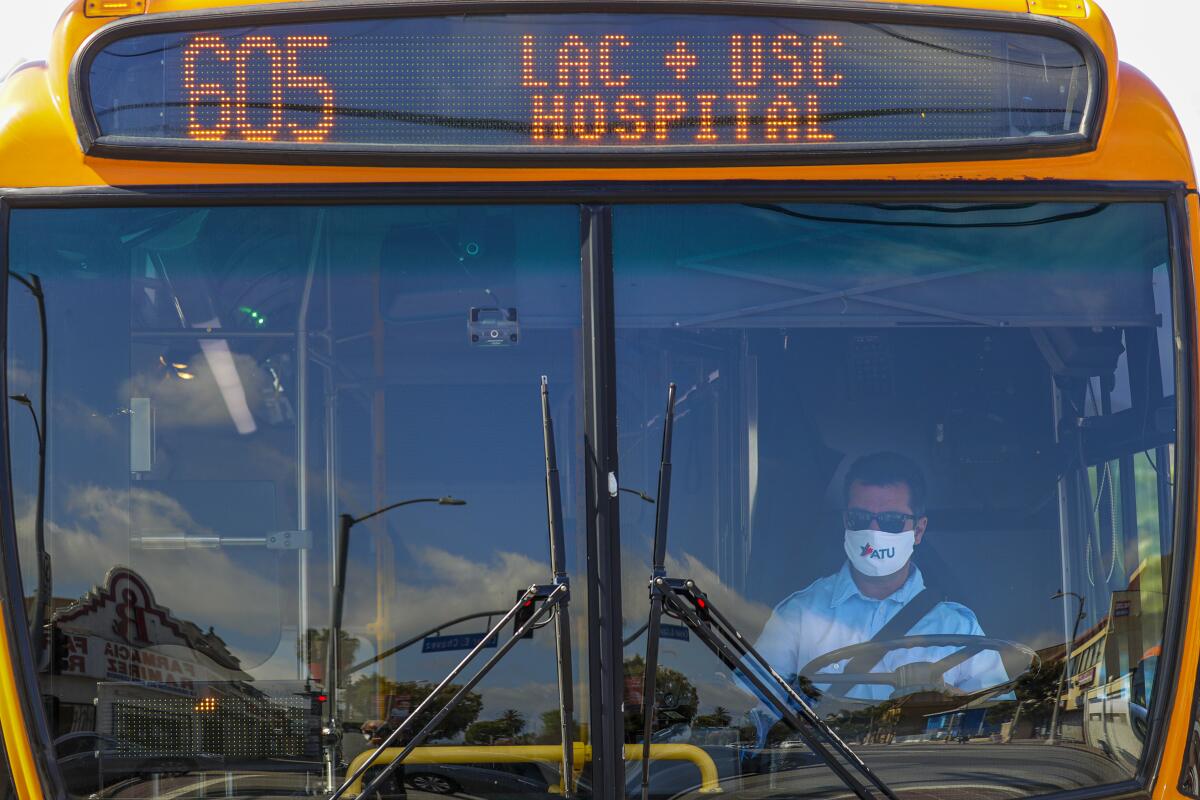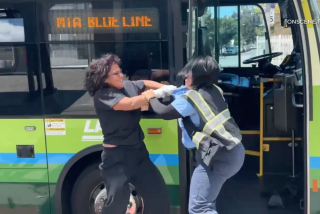Coughing echoes through the bus and Metro drivers wonder, ‘Am I going to catch it today?’

Coughing filled the bus as Metro’s Line 33 rumbled down Venice Boulevard. The driver looked on, horrified, as a passenger hacked repeatedly into his hands and wiped his palms on the seat.
“I was disgusted and uneasy,” said the driver. “Like, come on, man. What if someone sat there and they didn’t know? That’s how the virus spreads.”
For thousands of Metropolitan Transportation Authority bus drivers, going to work during a pandemic means spending hours in a confined space with strangers, wondering whether this will be the day they get sick.
Ridership on Los Angeles County buses has fallen 65% since the coronavirus outbreak began. But some lines are still so full that social distancing is impossible, according to interviews with a dozen drivers who spoke on the condition of anonymity because they were not authorized to speak publicly.
Too many riders are defying California’s stay-at-home orders by making nonessential trips, drivers say. Those passengers are breathing the same recirculated air and touching the same surfaces as the janitors, grocery store clerks, line cooks and other workers on board who interact with strangers for a living.
Fears of contracting the disease have been exacerbated by periodic shortages of masks, hand sanitizer and other protective gear at Metro’s bus yards, and a lack of hazard pay, drivers said.
“If I come to work, am I going to catch it today? Will I catch it tomorrow? Will I catch it next week?” said a driver from a bus yard in Boyle Heights. “It’s always in the back of my head.”
He added: “These elected officials are calling medical workers heroes and grocery workers heroes and firefighters heroes. Yes, they are. But bus operators are heroes, too. Literally, we are the front line.”
The worst-case scenario, drivers say, is something like what happened to Jason Hargrove. In a video posted to Facebook, the Detroit bus driver said a passenger coughed on him several times without covering her mouth. As he wiped his face with a tissue, he said, he felt “violated.” He died 11 days later of complications from COVID-19.
Nationwide, the death toll for transit workers stands at more than 100, including more than 80 fatalities in New York. At least 30 of those workers drove buses, New York transit officials said.
At least one transit worker in Southern California, a bus driver in Santa Clarita, has died of complications from the disease.
Of Metro’s 42 confirmed COVID-19 cases, 15 are bus drivers and seven are maintenance workers, the agency said. Eight bus yards, including in South L.A., Boyle Heights and West Hollywood, have had multiple cases confirmed. No drivers have died.
It has been impossible to know whether masks and hand sanitizer will be available until they clock in for their shifts, drivers said. Many have found their own: a neck gaiter from Amazon, a precious N95 respirator from a daughter who works at a dentist’s office, a stack of papery masks from the lobby of a Kaiser Permanente hospital.
One driver in northeast Los Angeles said he was reusing his surgical masks for several days to save the fresh masks for his older co-workers with health problems. His calculus, he said, was that “if I get sick, I’d probably survive.”
Nitrile gloves have been plentiful, but training on how to wear them and remove them has been scant, most drivers said.
Hand sanitizer has frequently been in short supply, drivers said. Workers at multiple yards said they were given a travel-size bottle of hand sanitizer and told to make it last a week or more. Some made their own, using aloe vera and rubbing alcohol. Dispensers installed at some depots are frequently empty, they said.
“It’s like pulling teeth to get our supplies,” said Art Aguilar, the president of the union that represents mechanics at Metro and drivers at three other Southern California transit agencies. “MTA was not prepared for this pandemic — though I don’t think any agency was.”
Metro is facing the same national mask shortages as hospitals, fire stations and other employers with front-line workers, officials said. Orders for more gear are being managed “literally minute to minute,” Chief Operations Officer Jim Gallagher told directors in April.
The agency has ordered more than 1 million protective items, including more than 700,000 bottles of personal hand sanitizer and 10,000 face shields, spokesman Dave Sotero said. He said the wait time between an order and delivery can be two to four weeks.
Metro has distributed tens of thousands of surgical masks and bottles of hand sanitizer, and is doing “everything possible to ensure a safe work environment,” Sotero said, calling the drivers “truly dedicated and heroic public servants.”
He added: “Their concerns about safety are understandable given the grave threat this public health crisis poses.”
Drivers are taking stringent precautions to avoid bringing the virus home. Some are changing at the bus yards and bundling their dirty clothes into trash bags. One driver said she strips off her uniform in the garage. Another uses a steam cleaner, meant for bus seats, to sanitize his shoes.
“It is very, very scary,” said a driver who works on the Silver Line. “I have a big bump on my face because I’m wearing my mask so tight. I’m wearing long sleeves in the heat. My hands are cracked, I’m washing them so much. “
Metro passengers are now required to board through the back of the bus. Drivers have been told to close and fasten the clear plastic barrier that separates their seats from the fare box — but to accept any money that’s offered.
Rather than interact with strangers, most drivers said they’re waving money away. Some have taken it a step further, barricading the aisle leading to the fare box with bungee cords, twine or seat belts.
Metro has encouraged riders to wear masks but does not require them. The digital signs on the face of the buses now flash the line, the destination, and a new message: “Travel Safe: Wear a Face Mask on Board.”
Not requiring masks “feels like a slap in the face,” said a driver who works in Chatsworth. “If you have to wear a mask to go to Target or the grocery store, you should also need to do that when you get on a bus. You’re in a small, confined space with other people.”
Enforcing a mandatory mask rule on every bus in the county would be “physically impractical,” Sotero said.
In April, Metro reduced the number of hours that buses are on the street by about 29%. That means riders are facing longer waits between buses — and sometimes, more people on each bus.
One photo taken by a driver showed passengers standing in the aisles of a packed bus on Line 66 between Westlake and Montebello.
On busy lines, Metro can make adjustments quickly to address the “on-street reality,” Chief Executive Phil Washington said last week during a telephone meeting of the Metro board. Officials have added longer buses, or more frequent service, on some routes to relieve crowding.
“Social distancing on a bus? It doesn’t exist,” said a driver who works in South L.A. “Let’s say we board 15 people. How many of those are infected? Maybe it’s just one. Maybe it’s no one. We honestly cannot know.”
Sotero said drivers have “discretion to load their bus” to respect social distancing, because passenger loads can vary from line to line, and stop to stop.
The closures of nonessential businesses, and long lines at grocery stores, have presented their own problems. Before, if bus drivers needed to use the bathroom, they could pull over and run inside a fast-food restaurant or coffee shop. Drivers are now finding that there’s nowhere to go.
A driver in the San Fernando Valley said she drove for five miles searching for one.
“Driving along with nothing open, it’s the worst feeling in the world,” she said. She finally wound up at a laundromat in Studio City.
More to Read
Sign up for Essential California
The most important California stories and recommendations in your inbox every morning.
You may occasionally receive promotional content from the Los Angeles Times.










